The final technology workshop of the Spring 2017 semester held by the Operations and Information Management (OPIM) Department explored Internet of Things (IoT) through Splunk. It was the last in a series of technology workshops part of the OPIM Innovate Initiative. The workshop took place in the Gladstein Lab on Friday, April 21st. Continue Reading
Author: Taylor Begley
Gamification Workshop
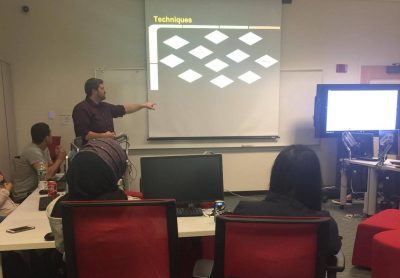
The UConn Operations and Information Management (OPIM) Department conducted a Gamification workshop on Friday, April 14. This comes as a part of a series of technology workshops being held by the department throughout the semester as a part of the OPIM Innovate Initiative.
OPIM Professor Jon Moore, one of the coordinators of OPIM Innovate, taught the workshop. Moore, also, currently teaches a course on Gamification here at UConn. The workshop gave students some background on the process of Gamification and an activity on the topic.
Gamification is the study of creating experiences that increase engagement and learning in variety of different environments – such as, marketing, customer engagement, training and efficiency enhancement, Moore said. The importance of Gamification has grown because of the increase in customer data and, in turn, the acquisition of more accurate analytics data that can predict and display exactly what clients want, he said.
“I believe that Gamification is a new topic and pretty exciting to study,” Moore said.
Many students that have taken his class are Management Information Systems (MIS) majors, but Moore said what is interesting about Gamification is that it attracts a diverse audience, because it is applicable for many different majors.
Moore’s goal for the workshop was to spark students’ interest in Gamification and to introduce the topic to those who did not know about it beforehand. He said he hoped to gain the interest of potential students and to lead them into taking his Gamification class in the Fall.
One of the students in attendance, Shanzay Iqbal said she thought the workshop and the topic was very interesting. Iqbal has attended most of the OPIM Department’s workshops throughout this year.
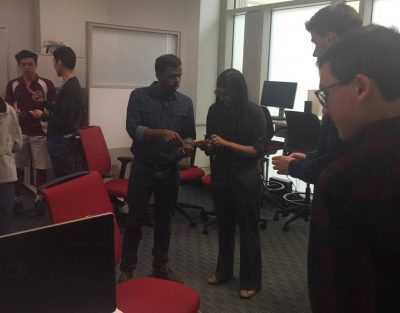
“I really enjoyed the activity because it engaged students. Some of the other workshops are more of a lecture format and aren’t as interesting. I’m a hands on person so I liked that,” Iqbal said.
Moore said he included an activity to keep his audience engaged throughout the workshop. He said because Gamification software is less hands-on, he decided to add a group activity halfway through the workshop.
Moore was pleased with the outcome of the workshop with positive responses overall from the students in attendance. He said that many students approached him following the workshop, showing interest and seeking more information on the topic.
Additionally, Moore said he is looking for students who are interested in helping with Gamification consulting in the future, because many companies and outside organizations have shown interest in partnering in the space.
The last workshop of the semester, Exploring IoT through SPLUNK Analytics, will be taking place on Friday, April 21st in the Gladstein Lab. Please register here to reserve your spot in the workshop, as space is limited.
Demonstration of Raspberry Pi
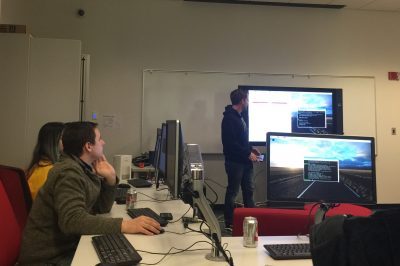
The latest in a series of technology workshops held by UConn’s Operations and Information Management (OPIM) Department demonstrated Raspberry Pi. The workshop was held in the OPIM Department’s Gladstein Lab on Friday, April 7th, as part of the department’s new OPIM Innovate Initiative.
The attendees of the workshop came from a wide range of backgrounds beyond Management Information Systems (MIS), including students from the School of Engineering and Computer Science Department.
OPIM adjunct faculty member, Ryan O’Connor instructed the workshop, stating his goal was to explain Raspberry Pi technology and show students what the technology is capable of.
O’Connor said that Raspberry Pi is a Microcontroller, which is basically a tiny portable computer. He said that some common uses of Raspberry Pi technology are to control devices in the home, to host a web server and for Internet of Things (IoT) technology, just to name a few.
“The possibilities are pretty much endless with Raspberry Pi,” O’Connor said.
During the workshop, O’Connor gave an introduction to Raspberry Pi and instructed students on 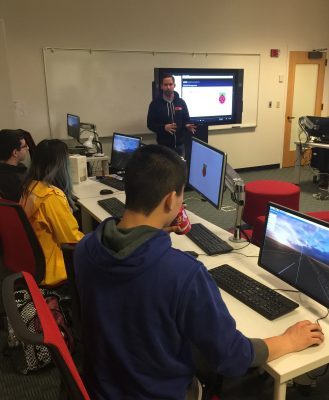 how to host and solve a web server using the technology.
how to host and solve a web server using the technology.
“By the end of the class everyone was hosting a web server off of Raspberry Pi. I don’t think that’s something they thought they’d be able to say coming out of the workshop, so I think it went well,” O’Connor said.
Students in attendance said they found the workshop and O’Connor’s presentation to be extremely informative. O’Connor said he was pleased with the outcome of the workshop, calling it a great success.
The next workshop, an Introduction to Gamification will be taking place on Friday, April 14th in the Gladstein Lab. Please register here to reserve your spot in the workshop as space is limited.
Getting Started with SAS
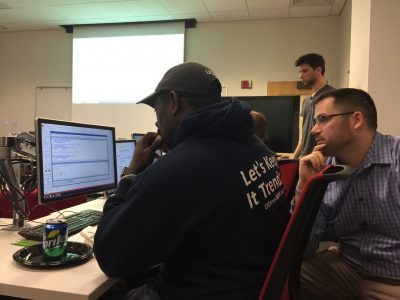
The Operations and Information Management (OPIM) Department’s technology workshops continued on Friday, March 24th with an Introduction to SAS. The workshops are sponsored by the department throughout the semester as part of the OPIM Innovate Initiative.
UConn Management Information Systems (MIS) graduate and current OPIM adjunct faculty member, Marshall Dougherty instructed the workshop in the Gladstein Lab. In addition to his position here at UConn, Dougherty works at Traveler’s in Hartford where he said he uses SAS technology to perform analytics and automation.
According to Dougherty, SAS is a programming language, computer program and a software suite all in one. He said that the reason he really likes SAS is because it allows you to code the way you want to. A foundation of knowledge in SQL is very helpful to understanding SAS, because it can be used within the SAS program.
Through the workshop, Dougherty said he hoped to help the attendees to get over the initial “fear factor” of starting to work with SAS. He said his goals were to provide attendees with an educational first experience with SAS by introducing them to the basic functions, such as inputting information.
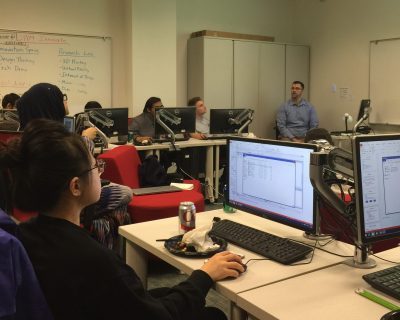
The workshop gave a hands-on, interactive experience with SAS. Dougherty gave recommendations on how to successfully work with SAS and he guided students through using the program. Students were able to ask questions and receive assistance during the presentation.
“I hope the audience came away with a basic understanding of how to take excel files, put them into SAS and work with it,” Dougherty said.
One MIS student in attendance, Marc Senatore said he found the workshop to be very instructional. He said it sparked his interest in exploring SAS further. Senatore said it made him very interested in taking Dougherty’s SAS class in the Fall, if he were not graduating.
The next workshop, an Introduction to Raspberry Pi will be taking place on Friday, April 7th in the Gladstein Lab. Please register here to reserve your spot in the workshop as space is limited.
Additionally, Jon Moore, the coordinator of the OPIM Innovate Initiative said he would like to hear any feedback or suggestions that students have and to please email him at jonathan.a.moore@uconn.edu with these requests.
Practicing with SQL
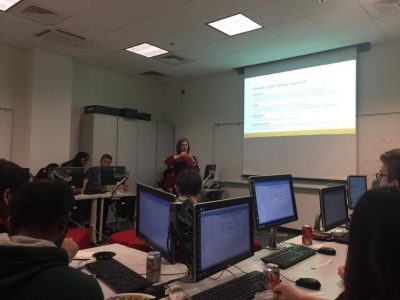
On Friday, February 24th, the Operations and Information Management (OPIM) Department’s Gladstein Lab maxed out in attendance for the second technology workshop of the semester, an Introduction to SQL. The workshop is part of a series of technology workshops being put on by the department throughout the semester, as part of the new OPIM Innovate Initiative.
For those who do not know, SQL (Structured Querying Language) is a data-driven application that retrieves information from databases and allows for creating, processing and querying data by retrieving information.
Anna Radziwillowicz, an Instructor in-Residence at the Hartford and West Hartford campuses, taught the workshop with the goal of giving students a basic understanding of SQL and practice writing queries. Radziwillowicz gave a background on databases before moving into creating a data table.
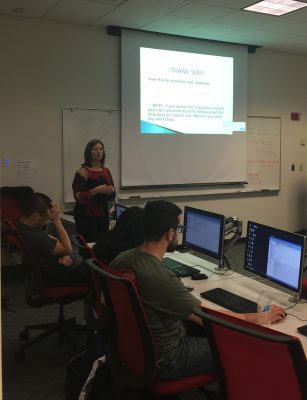 Three students at the workshop claimed to have previous experience using SQL, Radziwillowicz said. Because the majority of the students did not have any or limited experience, she concentrated on giving students a basic overview of the technology, not going too far in depth. She said that a continuation class was a possibility if there was enough interest.
Three students at the workshop claimed to have previous experience using SQL, Radziwillowicz said. Because the majority of the students did not have any or limited experience, she concentrated on giving students a basic overview of the technology, not going too far in depth. She said that a continuation class was a possibility if there was enough interest.
The OPIM Department created demo accounts for students to practice with SQL. During the workshop, students practiced retrieving data from a database, creating a data table and entering data to the table.
At the end of the workshop, Radziwillowicz said students could request a personal account to further practice with SQL at the Business Help Desk by mentioning completion of the workshop.
Keep up-to-date with the upcoming workshops and register online ahead of time to reserve your spot at the next workshop.
About the OPIM Innovate Initiative
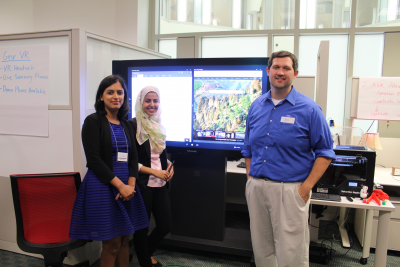
OPIM Innovate is the new initiative adopted by the Operations and Information Management (OPIM) Department in the Fall 2016. The initiative was developed to market the Management Information Systems (MIS) major and to bring new emerging technology to students.
Department Head Ram Gopal and Instructor in-Residence Jonathan Moore developed and implemented the initiative by expanding the department’s research lab space, bringing in new emerging technology. The lab is equipped with Virtual Reality (VR), 3D Printing, Internet of Things (IoT), Microcontrollers and data analytics.
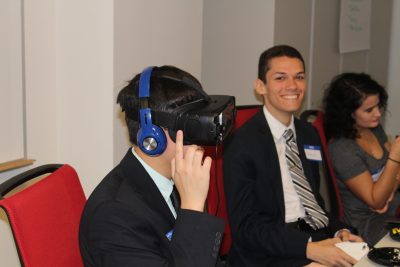
Initially, the OPIM Department came up with the initiative because they were finding that MIS students with internships in the field were working in innovation centers with technologies, such as IoT, drones, and VR.
“We realized that many interests lie in technology outside the provided curriculum,” Moore said of the expansion.
Moore said that this idea lead to building a more dedicated space for students and faculty in the department to work on projects and learn about different types of technology outside of the classroom. As a whole, the initiative is meant to help students work through the process of completing a project, while learning new technology in the process.
Beginning in the Fall, Moore organized multiple workshops for students featuring different topics relating to new technology. So far there have been workshops about Linux, 3D Printing, Splunk Analytics, IoT, Tableau, and VR. What started as exclusive to MIS students, workshops are now open to all students.
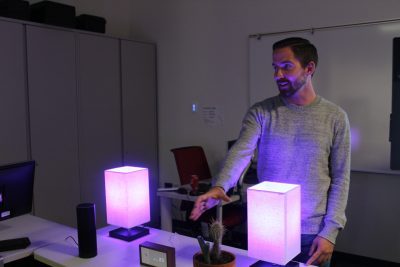
This spring, with the initiative more developed, OPIM Innovate hired a team of students, trained in the design thinking process to operate the Innovation Space and Research lab. Having these students involved helps guide users of the space and to provide technology demonstrations and follow ups to the formal workshops.
An advisory group, made up of students and faculty, has been formed for the initiative to brainstorm different ideas, provide feedback on the current processes and to build buy-in from different areas. Moore said that they are always looking for students or faculty interested in joining the advisory group to share their ideas for the innovation space, future workshops, and to give him any feedback they may have. Any individuals interested in joining the advisory group should contact Jonathan Moore at jonathan.a.moore@uconn.edu.
In the future, Moore hopes to team up with other groups at UConn and potentially outside companies to advance the space and better the experience for students.
Get Up and Running with Linux
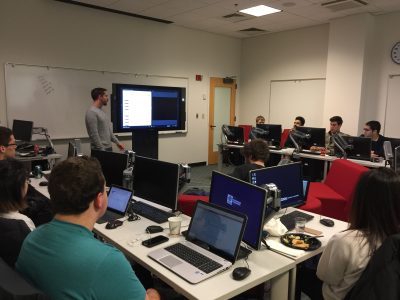
The Operations and Information Management (OPIM) Department kicked off the first in a series of technology workshops on Friday, February 10th as part of the department’s newly implemented initiative called OPIM Innovate.
OPIM faculty member, Ryan O’Connor instructed the workshop, introducing the Linux operating system. The workshop focused on giving attendees a background on Linux and how to use it.
O’Connor went on to explain the different systems that operate on Linux, such as – research systems, gaming systems, Androids, supercomputers and point-of-sale machines. As for what makes Linux a superior operating system, O’Connor said it is more secure than Windows or Mac.
“Every Facebook post you make, every YouTube video you watch, every Google search you run, is done on Linux,” O’Connor said, quoting an article from ZDNet.
Because of this fact, Linux is important beyond just the information technology field, but in every day life, O’Connor said. The Internet would not run without the Linux system, he said.
When O’Connor asked the group if they had any experience using Linux in the past, many students responded to having some exposure to the software. One student admitted to using Linux for his every day needs for a year, giving up Windows and Mac programs. He said that through this experiment he found that the only thing he missed from other operating systems were the Microsoft Office programs. Other than that, he said Linux was very efficient.
Another student said that prior to the workshop he was aware of Linux. Alex, an engineering student, said he came to the workshop to gain more exposure and experience with the technology because he knows just how widely it is used.
To conclude the workshop, O’Connor gave students information on how to get up and running with Linux, using VirtualBox software.
Despite the snow from the day before, there were 22 students in attendance for the workshop, which took place in the OPIM Department’s Gladstein Lab. The majority of attendees registered in advance with a few students walking in.
The next workshop, an Introduction to SQL, will take place on Friday, February 24th in the Gladstein Lab. Interested individuals are encouraged to sign up ahead of time to secure a spot.
OPIM Workshops for the Spring 2017 Semester
The OPIM Department is excited to announce the schedule for this semester’s technology workshops. The first in a series of skill-building workshops will be held next week, followed by three others over the course of the semester.
All workshops will be held in the OPIM Research Lab (BUSN 391). Food and refreshments will be provided for participants.
Over the course of the spring semester we plan to have the following workshops:
- Introduction to Linux – Friday, February 10th
- Introduction to SQL – Friday, February 24th
- Introduction to SAS – Friday, March 24th
- Introduction to Raspberry Pi – Friday, April 7th
- Introduction to Gamification – Friday, April 14th
- Exploring IOT through SPLUNK Analytics – Friday, April 21st
All workshops will be capped at 20 people so be sure to register online ahead of time.
Tableau: An Introduction to Data Analytics
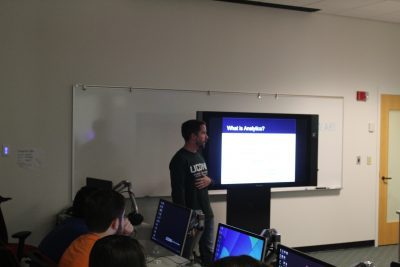 The Dean’s Office at the UConn School of Business sponsored a workshop on Tableau data visualization software for students in the Business Connections Learning Center (BCLC). The two-hour workshop took place on the morning of Thursday, December 1st, with 20 students in attendance, the majority of whom were freshmen.The workshop was co-taught by two faculty members in the Operations and Information Management (OPIM) Department – Jon Moore and Ryan O’Connor.
The Dean’s Office at the UConn School of Business sponsored a workshop on Tableau data visualization software for students in the Business Connections Learning Center (BCLC). The two-hour workshop took place on the morning of Thursday, December 1st, with 20 students in attendance, the majority of whom were freshmen.The workshop was co-taught by two faculty members in the Operations and Information Management (OPIM) Department – Jon Moore and Ryan O’Connor.
The purpose of the workshop was to introduce freshmen and sophomore undergraduate students to data analytics technology and data visualization. The workshop allowed students to learn more about the Management Information Systems (MIS) major and potentially spark their interests in the subject.
The instructors walked students through basic data visualization on the Tableau software and allowed students to experiment with different data sets. The workshop finished with an open-ended problem that asked students to find different stock price data sets and visualize them. The goa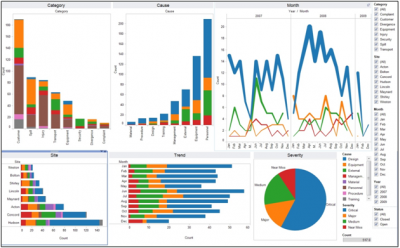 l was to allow students to visualize and connect the data sets to real world business problems.
l was to allow students to visualize and connect the data sets to real world business problems.
Moore said that the workshop allowed students to learn more about how to use technology in their respective majors. A variety of majors were represented, including MIS, Marketing, Accounting and Finance.
The event was voluntary and Moore was pleased with the turn out. He said that it was very rewarding to see the amount of students that expressed interest in the subject. Following the workshop, O’Connor gave students resources to learn more about Tableau going forward.
What is Internet of Things technology?

The final technology workshop for the Fall 2016 semester put on by the Operations and Information Management (OPIM) Department on Internet of Things (IoT) took place on Friday, December 2nd. Approximately 20 students attended the workshop in the Gladstein Lab.
Professor Ryan O’Connor gave an interactive presentation to the group, explaining IoT and how it is used in business. His goal was to make IoT technology tangible for students and to teach them more about how it applies to different areas of business.
According to O’Connor’s presentation, the concept of Internet of Things refers to the ever-growing network of physical objects that feature an IP address for internet connectivity, and the communication that occurs between these objects and other Internet-enabled devices and systems.
O’Connor said he became interested in IoT because he is involved in network design and application. He used the Amazon Echo named Alexa as an example of IoT technology during his presentation. Using voice commands, Alexa controlled other devices in the room through Internet connectivity. Other devices shown were the Awair air monitoring system, Flower Power plant sensor, and LIFX smart light bulbs.
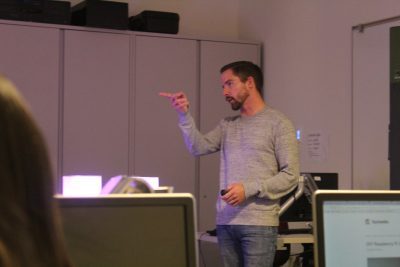
Students in attendance were impressed with the presentation and many said they learned many things about IoT in such a short time. One student said he was very interested in the presentation and wanted to continue exploring IoT after the workshop. He said that O’Connor’s presentation was extremely informative and sparked his interest in the topic even further.
When asked why IoT technology is so important, O’Connor answered simply, “Because it’s the future!”